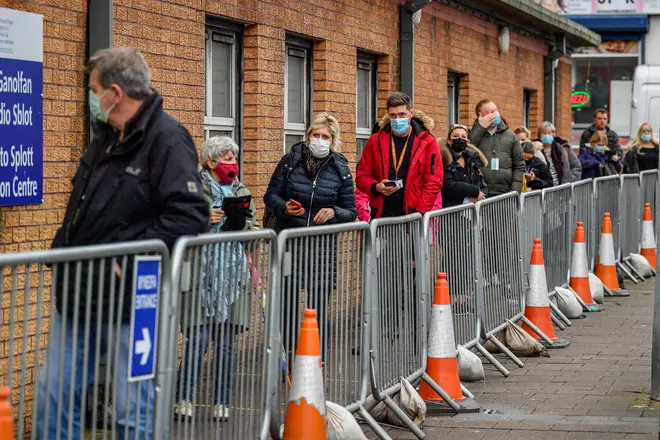
James O'Brien 10am - 1pm
19 February 2021, 00:01

Stay-at-home restrictions in Wales have been extended for three more weeks as the youngest children begin their return to school from Monday.
First Minister Mark Drakeford will announce the move on Friday, adding that thanks to Wales’ team effort, cases of coronavirus are at their lowest level since the end of September, with the seven day case rate standing at 84 per 100,000 people.
One in three adults in Wales has had their first dose of the coronavirus vaccine - 822,633 people, the equivalent of 26.1% of the total population of Wales, and 32.6% of people aged 18 and over.
Read more: Covid cases fall in all regions of England as number vaccinated nears 17 million
Foundation phase children aged between three and seven will resume face-to-face learning from next week, having been prioritised due to being least likely to transmit coronavirus and having greater difficulties with remote learning.
There will also be returns for some vocational learners, including apprentices, to colleges in order to access training or workplace environments for their practical qualifications.

90% of new cases in Wales will be new variant, says Drakeford
The First Minister will also talk about encouraging green shoots of recovery and look ahead to the next review when the Welsh Government will be considering if all primary pupils and some older students can return to schools and colleges from March 15, if the public health situation continues to improve.
Mr Drakeford previously said that older primary and secondary schools will look to use blended learning when they do return to classrooms, with pupils only in school "some of the time" by mixing face-to-face teaching with online lessons.
The next review of the regulations will consider the restrictions around non-essential retail and close contact services.
A total of 90.1% of people aged 80 and over had received their first dose, along with 91.9% of people aged 75-79 and 91.1% of people aged 70-74.
The latest figure for care home residents is 82.9%, for care home workers it is 85.1%, and for the clinically extremely vulnerable aged 16-69 it is 82.2%.
There were a further 290 cases of coronavirus reported in Wales in the past 24 hours, taking the total number of confirmed cases to 200,456.

Intensive care consultant updates LBC on the Coronavirus situation in Wales
Public Health Wales reported another 14 deaths, taking the total in the country since the start of the pandemic to 5,189.
On Wednesday, Boris Johnson said he was "reluctant" to link high coronavirus death rates in the south Wales valleys to austerity measures imposed by previous UK Governments.
The Prime Minister said there was "no doubt" that some areas of the UK had been hit worse than others during the pandemic but added that he believed the reasons behind them were "multifactorial".
He travelled to south Wales to carry out a series of Covid-19 related visits, which included Cwmbran's mass vaccination centre, South Wales Police's headquarters in Bridgend, and the new UK Government hub in Cardiff.
Asked during a Welsh media Q&A if he agreed with First Minister Mark Drakeford's recent comments that poverty caused by austerity was behind the high rates of death in valleys communities, Mr Johnson said: "There is no doubt that sadly some parts of the UK have been worse hit than others.
"I think that there will be a time when we go over everything and when we try and isolate all the causes. But I think it is multifactorial. I think there are lots of different things going on. Possibly different factors present in different places.
"I think I'd be reluctant to ascribe a single cause like that. I think there are many different vulnerabilities that different groups may or may not have."
Mr Johnson also said that Westminster would be making sure that all areas of the UK were "properly resourced" with vaccines into the autumn and beyond but said there was "currently no plan to differentiate between different parts of the country".
His comments contrast with ones previously made with Mr Drakeford last month when he said that Wales would likely receive "a little more" of the UK's share of vaccines because it has the oldest population.
Asked why he was visiting Wales when the UK population was being asked not to travel, Mr Johnson said: "My job is to oversee the rollout of the vaccination programme and go round the country thanking everybody who's doing it.
"I think it's right for me to do that and right for people to hear from me and also hear them put their points to me directly wherever I go around the country about how they see things, what they want done, and I think it's a very important part of getting this job done."